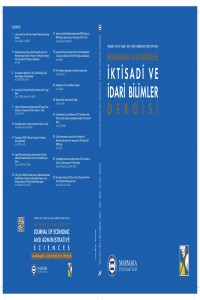Abstract
In a perfect capital market, investments should not be related to cash flows of the firm. Investments
should only be determined by the amount of renewal investments required and growth opportunities
available to the firm. Contrarily, due to the conflicts of interest between the managers and the
shareholders, the theory on agency costs and free cash flow hypothesis propose that managers are
inclined to over-use free cash flow, which is in excess of value-adding investments. It is claimed that
firms invest their extra free cash flow on projects with returns below cost of capital of the firm. Some
prior studies made on the topic implied the validity of this hypothesis. In other words, firm’s resources
might be wasted by means of over-investing. This study, based on a panel data of 154 Borsa Istanbul
firms observed between 2005-2015, confirmed that firms over-invest when there is free cash flow
available in excess of growth opportunities and dividends. Prior studies have used mostly regression
models or Tobin’s q to estimate investment prospects of the firm. However, this study adopted a direct
method to estimate investment opportunities available to the firm.
References
- ALLAYANNIS, G., and Mozumdar, A. (2004). The Impact of Negative Cash Flow and Influential Observations on Investment–Cash Flow Sensitivity Estimates. Journal of Banking and Finance, 28(5), 901-930.
- BERGSTRESSER, D. (2006). Discussion of “Overinvestment of Free Cash Flow”. Review of Accounting Studies, 11(2-3), 191-202.
- BREUSCH, T. S., and Pagan, A. R. (1980). The Lagrange Multiplier Test and Its Applications to Model Specification in Econometrics. The Review of Economic Studies, 47(1), 239-253.
- CARPENTER, R. E., and Guariglia, A. (2008). Cash Flow, Investment, and Investment Opportunities: New Tests Using Uk Panel Data. Journal of Banking and Finance, 32(9), 1894-1906.
- CHANG, S. C., Chen, S. S., Hsing, A., and Huang, C. W. (2007). Investment Opportunities, Free Cash Flow, and Stock Valuation Effects of Secured Debt Offerings. Review of Quantitative Finance and Accounting, 28(2), 123-145.
- CHEN, X., Sun, Y., and Xu, X. (2016). Free Cash Flow, Over-Investment and Corporate Governance in China. Pacific-Basin Finance Journal, 37, 81-103.
- DOUKAS, J. (1995). Overinvestment, Tobin’s q and Gains from Foreign Acquisitions. Journal of Banking and Finance, 19(7), 1285-1303.
- FAZZARI, S. M., Hubbard, R. G., Petersen, B. C., Blinder, A. S., and Poterba, J. M. (1988). Financing Constraints and Corporate Investment. Brookings Papers on Economic Activity, 1988(1), 141-195.
- GUGLER, K., Mueller, D. C., and Yurtoglu, B. B. (2004). Marginal q, Tobin’s q, Cash Flow, and Investment.Southern Economic Journal, 70(3), 512-531.
- HAUSMAN, J. A., and Taylor, W. E. (1981). Panel Data and Unobservable Individual Effects. Econometrica: Journal of the Econometric Society, 1377-1398.
- HOSHI, T., Kashyap, A., and Scharfstein, D. (1991). Corporate Structure, Liquidity, and Investment: Evidence from Japanese Industrial Groups. The Quarterly Journal of Economics, 106(1), 33-60.
- HUBBARD, R. G. (1997). Capital-Market Imperfections and Investment (No. w5996). National Bureau of Economic Research.
- JENSEN, M. C. (1986). Agency Cost of Free Cash Flow, Corporate Finance, and Takeovers. Corporate Finance, and Takeovers. American Economic Review, 76(2), 323-329.
- LANG, L. H., Stulz, R., and Walkling, R. A. (1991). A Test of The Free Cash Flow Hypothesis: The Case of Bidder Returns. Journal of Financial Economics, 29(2), 315-335.
- MODIGLIANI, F., and Miller, M. H. (1958). The Cost of Capital, Corporation Finance and the Theory of Investment. The American Economic Review, 48(3), 261-297.
- MORGADO, A., and Pindado, J. (2003). The Underinvestment and Overinvestment Hypotheses: An Analysis Using Panel Data. European Financial Management, 9(2), 163-177.
- OFFICER, M. S. (2011). Overinvestment, Corporate Governance, and Dividend Initiations. Journal of Corporate Finance, 17(3), 710-724.
- RICHARDSON, S. (2006). Over-Investment of Free Cash Flow. Review of Accounting Studies, 11(2-3), 159-189.
- STRONG, J. S., and Meyer, J. R. (1990). Sustaining Investment, Discretionary Investment, and Valuation: A Residual Funds Study of the Paper Industry. In Asymmetric Information, Corporate Finance, and Investment (pp. 127-148). University of Chicago Press.
- STULZ, R. (1990). Managerial Discretion and Optimal Financing Policies. Journal of financial Economics, 26(1), 3-27.
- VOGT, S. C. (1994). The Cash Flow/Investment Relationship: Evidence from US Manufacturing Firms. Financial Management, 23(2), 3-20.
- WHITED, T. M. (1992). Debt, Liquidity Constraints, and Corporate Investment: Evidence from Panel Data. The Journal of Finance, 47(4), 1425-1460.
Details
| Subjects | Economics |
|---|---|
| Journal Section | Makaleler |
| Authors | |
| Publication Date | July 19, 2017 |
| Submission Date | July 19, 2017 |
| Published in Issue | Year 2017 Volume: 39 Issue: 1 |
Cite
Marmara University Journal of Economic and Administrative Sciences is licensed under Attribution-NonCommercial 4.0 International


